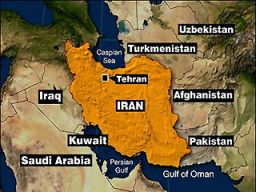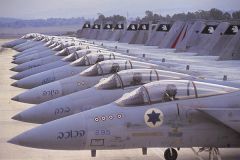|
De volgende stap in de neoconservatieve opmars naar Iran
Door Daan de Wit
Terwijl aan de oppervlakte de beroering slechts gestaag toeneemt en de druk op Iran groter wordt door sancties en straffe uitspraken over en weer, is het vertrouwen in een diplomatieke oplossing rap gedaald. In het openbaar zal de druk verder worden opgebouwd, maar achter de schermen wordt nog weinig waarde gehecht aan dit traject. In plaatst daarvan loopt men op de zaken vooruit door een oorlog met Iran verder voor te bereiden; de volgende stap is gezet in de neoconservatieve opmars naar Iran. Newsweek schrijft: 'In Washington [...] the consensus against a strike is firmer than most people realize. Uit Israël klinkt soortgelijk commentaar: '"Two thousand seven is the year you determine whether diplomatic efforts will stop Iran," says a well-placed Israeli source [...]. "If by the end of the year that's not working, 2008 becomes the year you take action."' 'The balance in the internal White House debate over Iran has shifted back in favour of military action before President George Bush leaves office [...]', schrijft The Guardian. 'Pentagon planners have developed a list of up to 2,000 bombing targets in Iran, amid growing fears among serving officers that diplomatic efforts to slow Iran's nuclear weapons programme are doomed to fail', aldus The Telegraph. Het is onwaarschijnlijk dat Iran niet zal worden aangevallen. De vraag is wanneer. Om te voorkomen dat zijn boek over Iran door de actualiteit wordt ingehaald, kreeg voormalig CIA-agent Robert Baer vorige maand de tip op te schieten. Hij verwacht een aanval binnen een halfjaar. De ultieme deadline: november 2008  Ook al is voorspellen onverstandig, één deadline houdt iedereen bezig, de Amerikaanse presidentsverkiezingen van november 2008: '[...] according to a well-placed Bush administration source, "everyone in town" is now participating in a broad discussion about the costs and benefits of military action against Iran, with the likely timeframe for any such course of action being over the next eight to 10 months, after the presidential primaries have probably been decided, but well before the November 2008 elections', schrijft Fox News. The Guardian: 'A well-placed source in Washington said: "Bush is not going to leave office with Iran still in limbo."' De conservatieve Pat Buchanan schrijft: '[...] Bush is now moving into Phase III in his War on Terror: First, Afghanistan, then Iraq, then Iran.' Ook al is voorspellen onverstandig, één deadline houdt iedereen bezig, de Amerikaanse presidentsverkiezingen van november 2008: '[...] according to a well-placed Bush administration source, "everyone in town" is now participating in a broad discussion about the costs and benefits of military action against Iran, with the likely timeframe for any such course of action being over the next eight to 10 months, after the presidential primaries have probably been decided, but well before the November 2008 elections', schrijft Fox News. The Guardian: 'A well-placed source in Washington said: "Bush is not going to leave office with Iran still in limbo."' De conservatieve Pat Buchanan schrijft: '[...] Bush is now moving into Phase III in his War on Terror: First, Afghanistan, then Iraq, then Iran.'Geen hoop meer op diplomatie Door de situatie in Irak en het geringe enthousiasme onder de hoogste militaire kaders voor het aangaan van een nieuwe belasting door een aanval op Iran, kreeg de factie rond minister van Buitenlandse Zaken Condoleezza Rice ruimte. Nu zij die niet heeft benut en haar ster tanende is, begint de gestaalde visie van vice-president Cheney weer de overhand te krijgen in het Witte Huis. De kwestie Iran is intussen nooit van tafel geweest en na een korte omtrekkende manoeuvre ligt de neoconservatieve regering weer op ramkoers. The Telegraph schrijft: 'Now it has emerged that Condoleezza Rice, the secretary of state, who has been pushing for a diplomatic solution, is prepared to settle her differences with Vice-President Dick Cheney and sanction military action. [...] A State Department source familiar with White House discussions said that Miss Rice, under pressure from senior counter-proliferation officials to acknowledge that military action may be necessary, is now working with Mr Cheney to find a way to reconcile their positions and present a united front to the President. The source said: "When you go down there and see the body language, you can see that Cheney is still The Man. Condi pushed for diplomacy but she is no dove. If it becomes necessary she will be on board.' In de arabische wereld lijkt men inmiddels overtuigd van het feit dat Rice 'on board' is. Een ronde van Inter Press Service langs arabische politieke deskundigen leert dat de recente tour door het Midden-Oosten van Rice en defensieminister Robert Gates wordt gezien als het verzamelen van steun voor een Amerikaanse aanval op Iran: 'According to local observers [...] the overriding objective of the visit – and of the proposed arms deals – was to promote a Sunni-Arab axis against Iran, which Rice has described as the primary "strategic challenge" to the U.S.' Toevallig incident of false flag luidt Iranoorlog in Ieder laatste bezwaar tegen een militaire aanval dat in Washington nog is te vinden, zal als sneeuw voor de zon verdwijnen in het geval er een aanslag op de VS zal plaatsvinden die is te herleiden naar Iran. Deze aanslag is al gezocht en is geforceerd, maar heeft nog niet plaatsgevonden. Hoe dan ook zal die worden gevonden, maar meer waarschijnlijk worden geforceerd. In dat geval zal die zoveel impact hebben dat het niet alleen voor Washington, maar ook voor de rest van Amerika en de wereld duidelijk is dat een militaire vergelding onvermijdelijk is. Het zal dan wederom aan de toekomst zijn om aan te tonen dat de geschiedenis zich weer heeft herhaald, van Irak in 1990 en 2003, Libanon en Hezbollah in 2006, via 9/11 tot Tonkin, Pearl Harbor en verder. Zelfs de gematigde expert buitenlandbeleid Steve Clemons, en zelfs in zijn artikel met de titel Why Bush Won't Attack Iran, houdt hij rekening met een conflict tussen de VS en Iran dat wordt geforceerd door de VS, meer bepaald afkomstig uit het kamp Cheney. Hij schrijft '[...] the president is not planning to bomb Iran. But there are several not-unrelated scenarios under which it might happen, if the neocon wing of the party, led by Vice President Cheney, succeeds in reasserting itself, or if there is some kind of "accidental," perhaps contrived, confrontation.' 'His gravest concern', schrijft The Raw Story naar aanleiding van een interview met Clemons, ‘was that the US might seize on an accidental incident -- such as a collision between a US and Iranian ship or a border skirmish between Iraq and Iran -- as a causis belli.' Clemons liet zijn gedachten voeden door de resultaten van een ronde-tafelconferentie van de New America Foundation die hij in augustus van vorig jaar voorzat. Achttien mensen namen deel, waaronder Zbigniew Brzezinski, de voormalig veiligheidsadviseur voor president Carter, Brent Scowcroft, die dezelfde functie bekleedde voor de presidenten Ford en de vorige president Bush. Ook aanwezig was Benazir Bhutto, de voormalig premier van Pakistan. Scowcroft sprak de hoop uit dat de Bushregering zal afzien van een nieuwe confrontatie in het Midden Oosten, nu met Iran. Brzezinski is minder hoopvol. Hij denkt dat de neoconservatieve regering in het Witte Huis een weg is ingeslagen die maar één eindpunt heeft: een militaire aanval op nucleaire doelen in Iran; een 'ramp', noemt hij dat in een interview met CNN. Bij stemming bleek dat de deelnemers aan de bijeenkomst grotendeels van mening waren dat de visie van Brezezinski de juiste is: ‘Scowcroft got only two votes, including his own. Everyone else at the table shared Brzezinski's fear that a U.S. strike against Iran is around the corner.' Clemons:  ‘A mistake in the Gulf where ships collide or US soldiers are attacked or Israel fires a low-level cruise missile attack against Natanz or there's a border skirmish between Iraq and Iran that results in the death of a high-ranking military or diplomatic official – any of these could spark a conflict'. In de Golf, aan boord van de USS John C. Stennis, schrijft de LA Times: 'On the ship's computer maps, a thick black line delineates Iranian coastal waters from the rest of the gulf. Shades of gray mark the waters off Saudi Arabia and the United Arab Emirates, allies of the United States. U.S. pilots are told to stay well away from Iranian airspace. "We do worry about miscalculations," [Vice Adm. Kevin J.] Cosgriff said. "That's one of the reasons we want to be transparent on the radio and be talking to them a lot."' ‘A mistake in the Gulf where ships collide or US soldiers are attacked or Israel fires a low-level cruise missile attack against Natanz or there's a border skirmish between Iraq and Iran that results in the death of a high-ranking military or diplomatic official – any of these could spark a conflict'. In de Golf, aan boord van de USS John C. Stennis, schrijft de LA Times: 'On the ship's computer maps, a thick black line delineates Iranian coastal waters from the rest of the gulf. Shades of gray mark the waters off Saudi Arabia and the United Arab Emirates, allies of the United States. U.S. pilots are told to stay well away from Iranian airspace. "We do worry about miscalculations," [Vice Adm. Kevin J.] Cosgriff said. "That's one of the reasons we want to be transparent on the radio and be talking to them a lot."'Het is echter de vraag of een regering met een vice-president als Dick Cheney, die volgend jaar wordt afgelost, geduldig een toevallig conflict gaat afwachten. Zoals bleek in het vorige deel van deze serie is ook Brzezinski hier nog niet zo zeker van. Hij houdt rekening met een false flag operation, dus in dit geval een aanslag waarvan Iran de schuld krijgt waardoor de VS reden hebben terug te slaan. Voorbereidingen op cruciaal incident Een variant op een cruciaal incident zoals een false flag, blijkt al te zijn bedacht door de Amerikaanse vice-president Dick Cheney.  David Wurmser, tot voor kort de Midden-Oostenadviseur voor Cheney, zegt dat zijn superieur sterk heeft overwogen Israël zo ver te krijgen dat het beperkte luchtaanvallen zou uitvoeren op nucleaire installaties in Iran. Doel hierbij was het uitlokken van een tegenaanval door Teheran, waardoor de VS genoodzaakt zouden zijn Iran militair aan te vallen. Inmiddels heeft Israël met instemming en hulp van de VS een aanval uitgevoerd onder de naam Operatie Orchard op een lokatie in Syrië waar met hulp van Noord-Korea aan een nucleair programma zou worden gewerkt. Eerder zouden Israëlische commando's in Syrië nucleair materiaal hebben ontdekt. David Wurmser, tot voor kort de Midden-Oostenadviseur voor Cheney, zegt dat zijn superieur sterk heeft overwogen Israël zo ver te krijgen dat het beperkte luchtaanvallen zou uitvoeren op nucleaire installaties in Iran. Doel hierbij was het uitlokken van een tegenaanval door Teheran, waardoor de VS genoodzaakt zouden zijn Iran militair aan te vallen. Inmiddels heeft Israël met instemming en hulp van de VS een aanval uitgevoerd onder de naam Operatie Orchard op een lokatie in Syrië waar met hulp van Noord-Korea aan een nucleair programma zou worden gewerkt. Eerder zouden Israëlische commando's in Syrië nucleair materiaal hebben ontdekt.Op basis van bronnen houdt Newsweek een slag om de arm over het waarheidsgehalte van de link tussen Syrië, Noord-Korea en nucleaire hulp. Ook The Observer houdt rekening met een neoconservatieve spin die een web van leugens weeft dat herinneringen oproept aan de opbouw naar de vorige oorlog, die tegen Irak: 'Underlying all the accusations was a suggestion that recalled the bogus intelligence claims that led to the war against Iraq: that the three countries might be collaborating to supply an unconventional weapon to Hizbollah.' Toen was er het Office of Special Plans, gericht op het creëren van desinformatie, nu is er het Iranian Directorate. Het is onbekend of deze organisatie iets heeft te maken met de achtergrond bij het verhaal over de aanval op Syrië. Joseph Cirincione, directeur nucleair beleid bij het Center for American Progress en auteur van het boek Bomb Scare: The History and Future of Nuclear Weapons, is duidelijk over de kwestie: 'This story is nonsense. The Washington Post story should have been headlined "White House Officials Try to Push North Korea-Syria Connection." This is a political story, not a threat story. The mainstream media seems to have learned nothing from the run-up to war in Iraq. [...] Once again, this appears to be the work of a small group of officials leaking cherry-picked, unvetted "intelligence" to key reporters in order to promote a preexisting political agenda. If this sounds like the run-up to the war in Iraq, it should.' De Israëlische aanval noopt Newsweek tot de onderkop: 'Israels Raid on Syria: Prelude to Nuke Crisis?' Was Operatie Orchard tevens een oefening voor een aanval op Iran, is de vraag die The Observer zich stelt. The Times schrijft: 'As a bonus, the Israelis proved they could penetrate the Syrian air defence system, which is stronger than the one protecting Iranian nuclear sites.' The Observer: 'Whatever the truth of the allegations against Syria - and Israel has a long history of employing complex deceptions in its operations - the message being delivered from Tel Aviv is clear: if Syria's ally, Iran, comes close to acquiring a nuclear weapon, and the world fails to prevent it, either through diplomatic or military means, then Israel will stop it on its own. So Operation Orchard can be seen as a dry run, a raid using the same heavily modified long-range aircraft, procured specifically from the US with Iran's nuclear sites in mind. It reminds both Iran and Syria of the supremacy of its aircraft and appears to be designed to deter Syria from getting involved in the event of a raid on Iran - a reminder, if it were required, that if Israel's ground forces were humiliated in the second Lebanese war its airforce remains potent, powerful and unchallenged.' Aan Israëls motivatie zal het niet liggen; Israël heeft zelfs geprobeerd de VS op de gedachte te brengen niet Irak aan te vallen, maar Iran. Het land verliest met een nucleair Iran het nucleaire machtsmonopolie in de regio. Aan premier Olmert van Israël zal het mogelijk ook niet liggen; die kan na de nederlaag tegen Hezbollah in Libanon wel succes gebruiken. 'When Prime Minister Ehud Olmert ordered the raid on Syria earlier this month, his approval rating was in the teens. Since then, it has jumped to nearly 30 percent. And though Olmert may not believe Israeli warplanes can get to all the targets, he might be willing to gamble on even a limited success. "No one in their right mind thinks that there's a clinical way to totally destroy the Iranian nuclear facilities," says the well-placed Israeli source. "You strike at some and set the project back. You play for time and hope Ahmadinejad will eventually fall"', schrijft Newsweek.
DeepJournal
Sign up for the free mailing list. |
|
9 September 2013
Why is Syria under attack? - Part 4
‘Syria’ is about power, money, influence and energy
8 September 2013
Why is Syria under attack? - 3
Syria and Iran are like pieces on a geopolitical chessboard
7 September 2013
Why is Syria under attack? - Part 2
On the interests of the parties involved in the Syrian conflict and the role of the media
6 September 2013
Why is Syria under attack? - Part 1
Who is behind the chemical weapons attack in Syria?
1 April 2013
Albert Spits: Creëer je eigen financiële veiligheid
Beluister het interview
|



